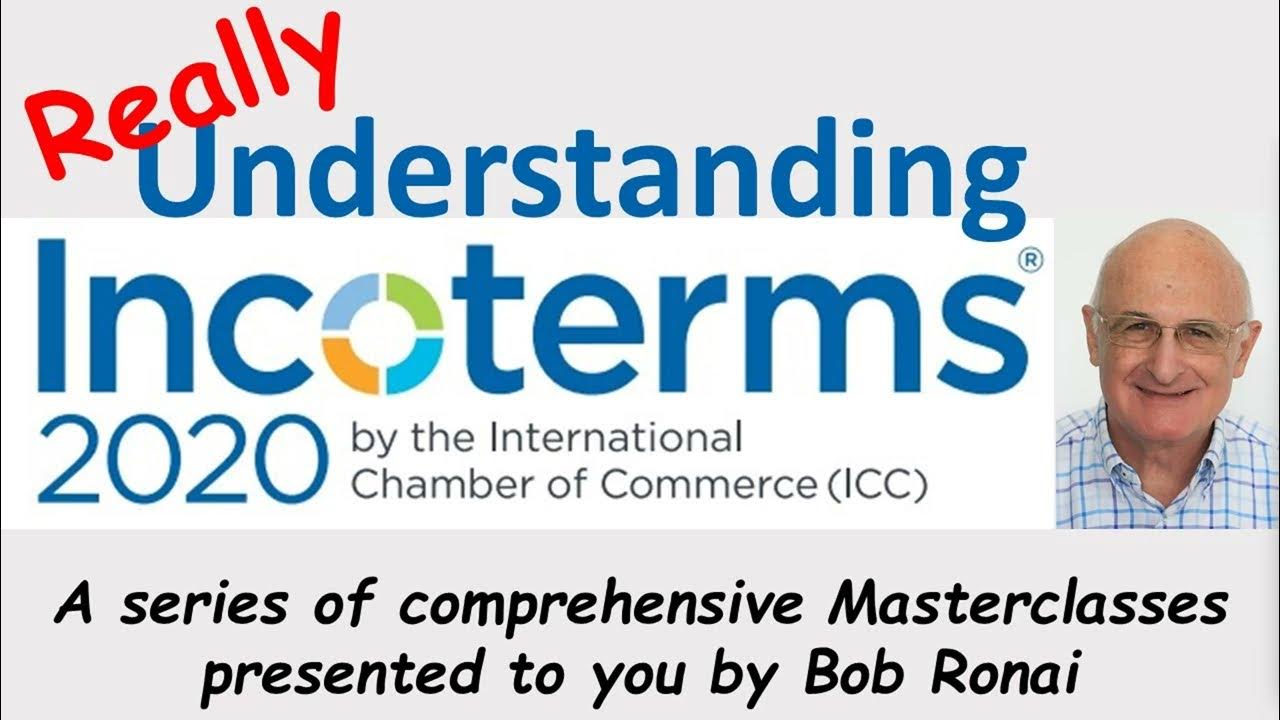Lesson 4 - FCA part 1 - it seems all so simple yet it needs two lessons to explain it properly!
Summary
TLDRIn this detailed lesson on Incoterms 2020, Bob Ronai provides an in-depth explanation of FCA (Free Carrier), covering crucial aspects such as delivery, taking delivery, and the allocation of costs. He elaborates on the responsibilities of both the seller and the buyer in the delivery process, including when and where the delivery should occur, and the importance of communication between the two parties. Ronai also addresses the intricacies of the relevant articles and the potential challenges that can arise, emphasizing the practical implications of these rules in international trade.
Takeaways
- 😀 The course provides an in-depth explanation of FCA (Free Carrier) Incoterms 2020, focusing on delivery and taking delivery.
- 😀 The instructor, Bob Ronai, is a member of the ICC's Incoterms 2020 drafting group, ensuring expert insight into the rules.
- 😀 The lesson emphasizes the importance of understanding delivery requirements in FCA, including the named place and the carrier's responsibilities.
- 😀 FCA delivery involves two options: the seller's premises or a designated point where the goods are ready for the buyer's carrier to collect.
- 😀 The concept of 'procure goods so delivered' refers to goods being passed through multiple sales, ensuring smooth transfer of responsibility.
- 😀 If the buyer fails to notify delivery time, the seller delivers at the end of the agreed period, potentially leading to disruption in coordinating carrier arrivals.
- 😀 The seller's responsibility under FCA stops when goods are delivered to the carrier or buyer's nominated person; the risk transfers immediately.
- 😀 The buyer must take delivery of the goods once they have been delivered under the FCA terms, regardless of whether goods are exported.
- 😀 The seller must provide sufficient notice to the buyer, indicating either delivery or failure by the carrier to take the goods on time.
- 😀 Communication between the buyer and seller is essential for smooth collection and transport of goods, with the buyer's carrier handling logistics.
- 😀 The next lesson will cover additional details about transport documents and cost allocation in FCA, providing a deeper understanding of the Incoterms.
Q & A
What is the main focus of this lesson on Incoterms 2020?
-The lesson primarily focuses on the FCA (Free Carrier) rule under Incoterms 2020, discussing its complexities, particularly Articles A2, B2 (Delivery), A6, B6 (Delivery and Transport Documents), and A9, B9 (Allocation of Costs).
What is the role of the seller in FCA delivery?
-In FCA delivery, the seller's role is to deliver the goods to the carrier or another person nominated by the buyer at the agreed point of delivery, either at the seller's premises or a specified location.
What are the two options for delivery under FCA?
-The two options for delivery under FCA are: 1) Delivery at the seller's premises, typically for freight collection, or 2) Delivery at the carrier’s premises, where the seller hands over the goods ready for unloading.
What does 'procure goods so delivered' mean in the context of FCA?
-'Procure goods so delivered' refers to a situation where goods are passed on in a string sale, meaning the first buyer sells the goods to the second buyer, and so on, until they are delivered to the final carrier.
When is delivery considered completed under FCA?
-Delivery is considered completed either when the goods are loaded onto the truck at the seller’s premises or when the goods are placed at the disposal of the carrier or another nominated person at a specified location, ready for unloading.
How does the concept of delivery differ from shipment in FCA?
-In FCA, delivery does not involve shipment on a vessel or aircraft. The seller’s responsibility ends once the goods are delivered, and the buyer assumes the risk from that point, even before shipment.
What happens if the buyer does not notify the seller about the delivery timing?
-If the buyer does not notify the seller about the timing of delivery within the agreed period, the seller is deemed to have delivered the goods at the end of that period.
What are the buyer's responsibilities under FCA regarding delivery?
-The buyer must take delivery of the goods once they have been delivered under the terms of Article A2. Additionally, the buyer must inform the seller of the carrier’s details, delivery point, mode of transport, and any other relevant information.
What is the significance of Article A10 in FCA?
-Article A10 outlines the notices that the seller and buyer must exchange. The seller must notify the buyer of delivery, and the buyer must provide the seller with details about the carrier, transport mode, and the timing of collection.
Why is it important for the buyer to notify the seller under FCA?
-The buyer must notify the seller to ensure that the seller delivers the goods at the correct time and place, as well as to inform the seller of the transport mode and any security requirements related to transport.
Outlines

This section is available to paid users only. Please upgrade to access this part.
Upgrade NowMindmap

This section is available to paid users only. Please upgrade to access this part.
Upgrade NowKeywords

This section is available to paid users only. Please upgrade to access this part.
Upgrade NowHighlights

This section is available to paid users only. Please upgrade to access this part.
Upgrade NowTranscripts

This section is available to paid users only. Please upgrade to access this part.
Upgrade Now5.0 / 5 (0 votes)





